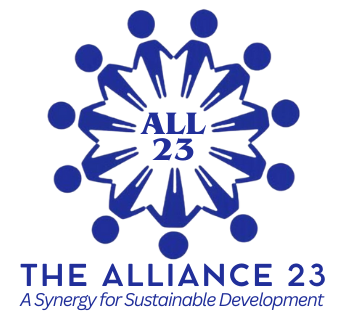Welcome to THE ALLIANCE 23
THE ALLIANCE 23
Welcome to Alliance 23
At Alliance 23, we believe in the power of collaboration and community. Our mission is to pool the resources and expertise of our members to deliver high-quality humanitarian and development services that uplift and empower communities. We are dedicated to building the capacity of our members across various development themes, ensuring that everyone has the tools and knowledge needed to make a meaningful impact. Through our extensive network, we facilitate information sharing and collaboration, fostering a supportive environment where innovative ideas can thrive. In addition, we actively engage in fundraising efforts, leveraging member contributions and seeking partnerships with funders to sustain our projects. Together, we work on initiatives envisioned by our members, turning ideas into action for the betterment of society. Join us at Alliance 23 as we strive to create lasting change through unity, empowerment, and shared purpose. Together, we can make a difference!
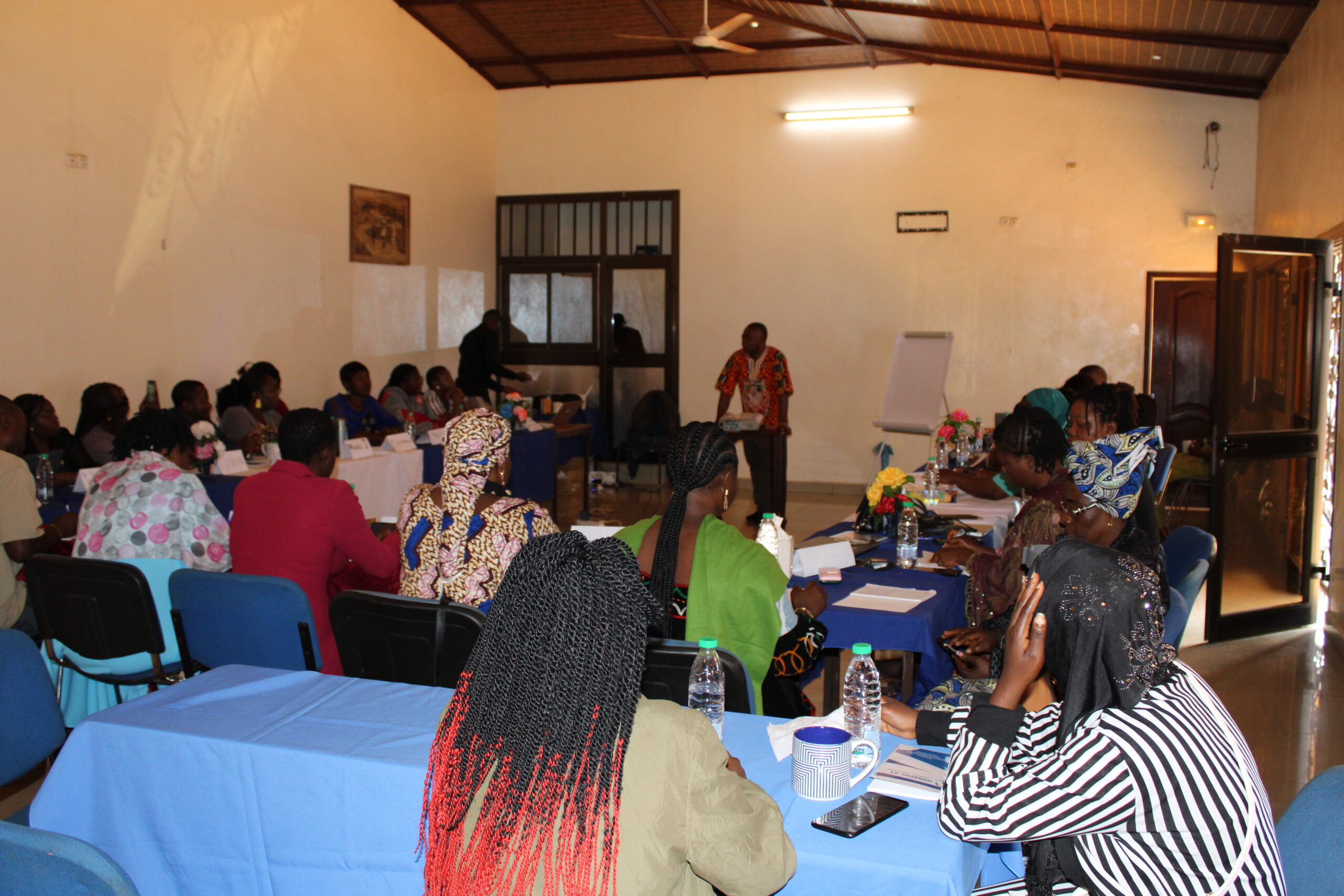
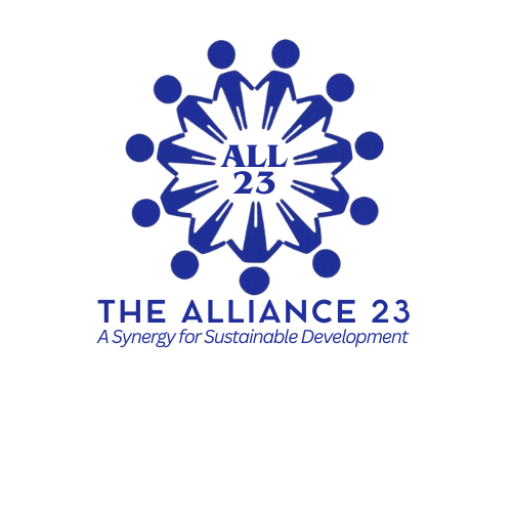
News
“Girls in Science” Spark Innovation and Confidence at Youth FESTAC 2025
Every June in Bamenda, YouthFESTAC(Youth Festival of Arts and Culture) brings together hundreds of young people in a celebration of creativity, culture, and empowerment. Organized annually by the Youth Outreach Programme (YOP) to commemorate the International Day of the African Child on June 16. The festival has become a vibrant platform for young voices to express themselves through art, innovation, and tradition. This year, in the heart of the festival’s third edition, a quiet yet powerful movement took center stage: Girls in Science.
Initiated by SkillsCenter with support from Alliance 23, and Mission 21, this bold initiative gathered 35 science-inclined girls from diverse secondary schools across the North West and West Regions of Cameroon for a hands-on, three-day journey into the world of renewable energy and technology. The goal was to inspire a new generation of girls to break barriers in STEM: Science, Technology, Engineering, and Mathematics, in order to see themselves as future engineers, scientists, and problem-solvers
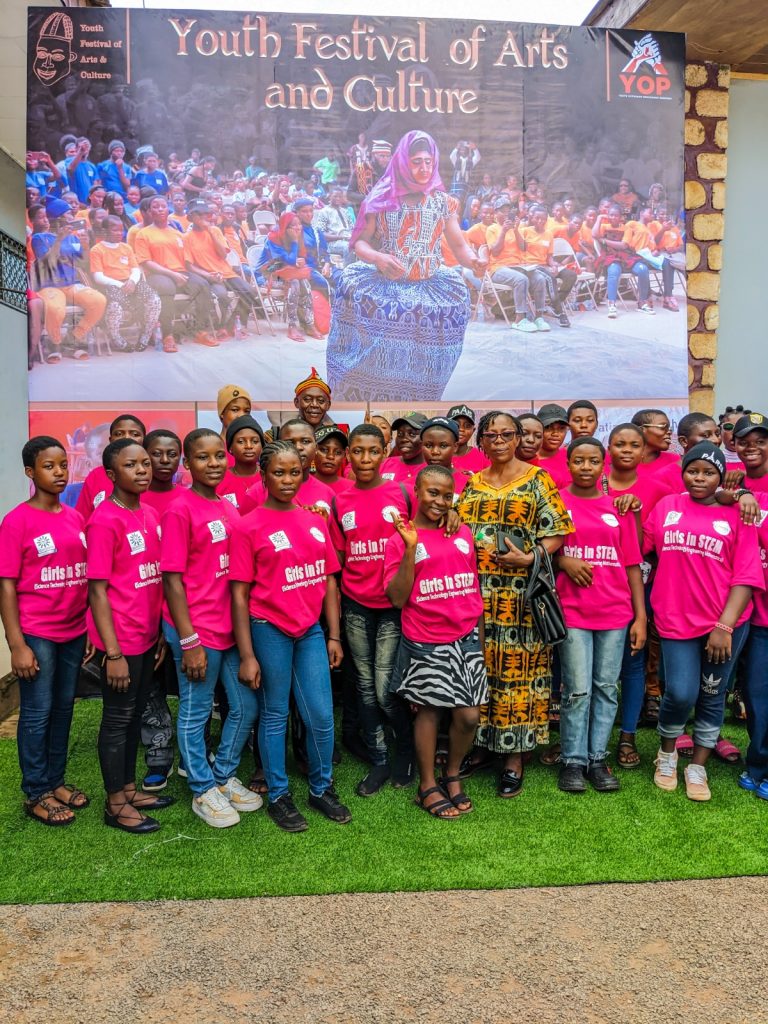
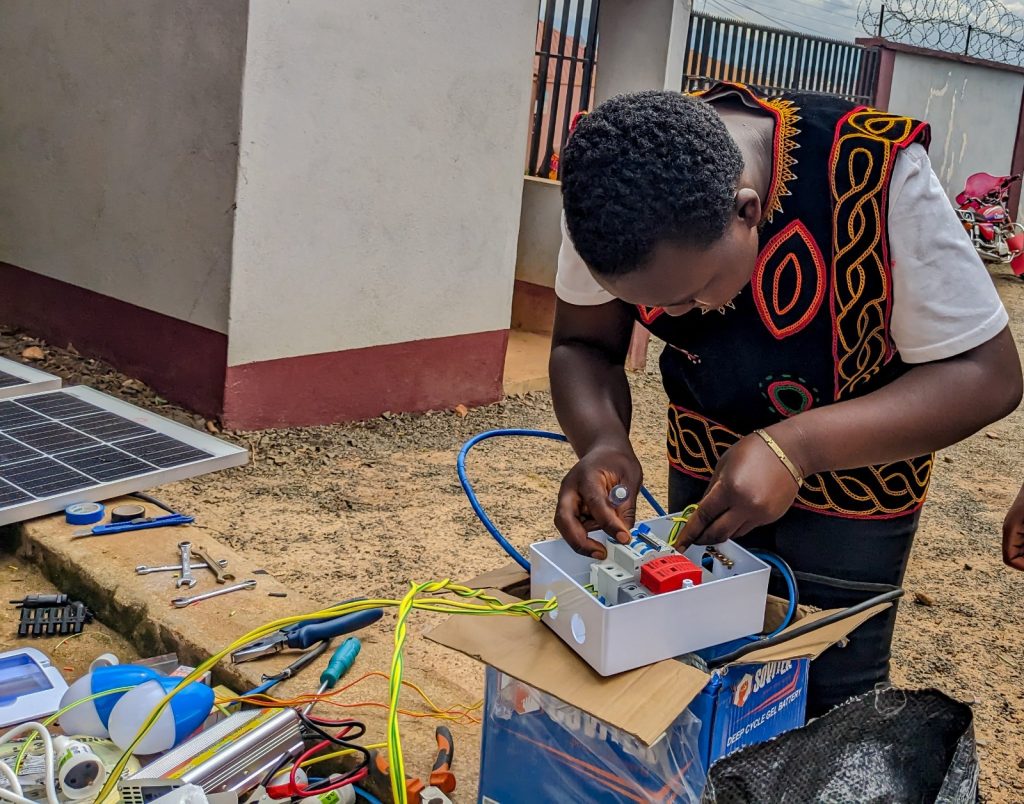
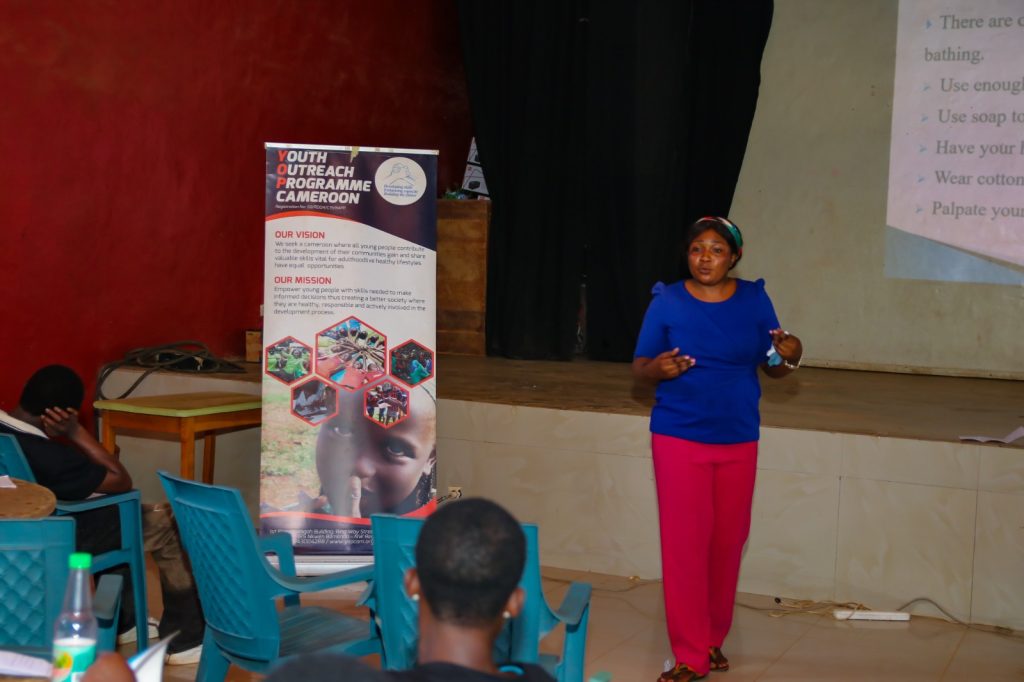
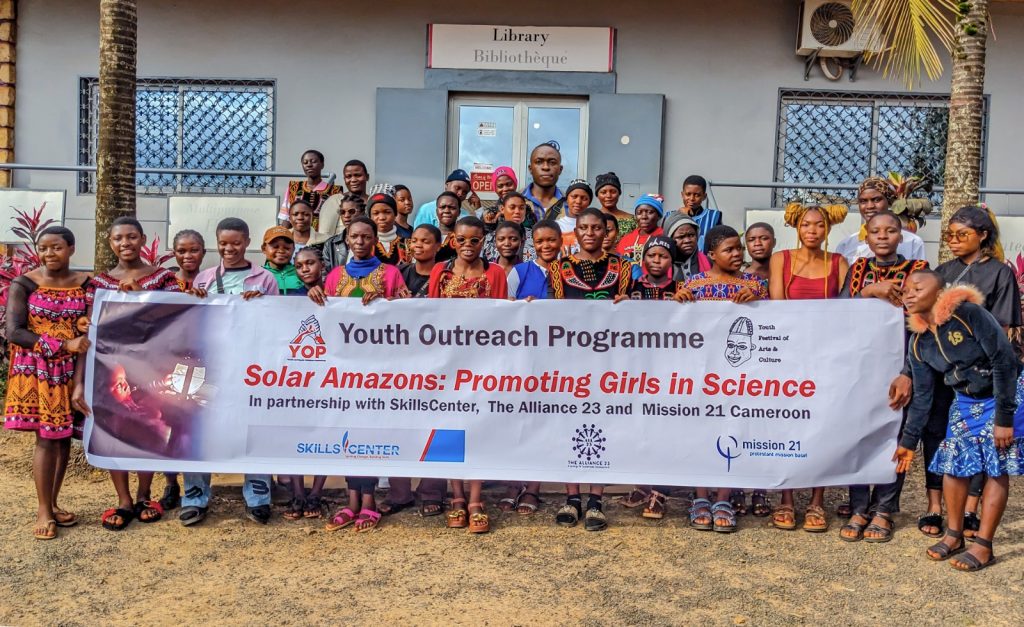
Led by renewable energy expert Engr. Nick Fonchi, the workshop introduced participants to the fundamentals of renewable energy (solar, hydropower, biomass, and wind), connecting these concepts to the real challenges faced in our communities, especially frequent power failures. “Science isn’t just theory,” Fonchi told the girls. “It’s the solution to the problems around you. And you have the power to solve them.”
From the first day, the atmosphere shifted. Through group discussions, simple experiments, and solar circuit-building activities, the girls began to see science not as a subject reserved for boys, but as a tool for change and one that belonged to them too. By the second day, the room buzzed with energy as participants split into groups to brainstorm solar-powered solutions for local challenges. They learned to connect solar panels, test models, and assemble systems which in many ways, mirrored their own growing confidence.
“I’ve learned things I never imagined,” said Leke Shelly-Bright, one of the participants. “I now understand how biomass is created and how it can be used to produce energy. It opened my eyes to how science affects everything.” Another participant, Deh Telcy Zou, reflected, “With the constant power cuts at home, learning about solar energy gave me hope. It’s clean, efficient, and now I know how it works.”
The girls closed the event with a heartfelt thank-you performance dedicated to Youth Outreach Programme. Girls in Science is more than a workshop, it’s a growing movement, one that says the future of science is female, and that solutions to Africa’s challenges lie not in waiting, but in empowering the next generation to lead. These girls may have walked into FESTAC as students but they left as innovators, dreamers, and change-makers.
Menstrual hygiene Day 2025
Today being menstrual hygiene Day 2025. Shalom Initiative in partnership with Cameroon Weltwärts Network, Young African Women Congress Network and The Alliance 23 launched the Healthy Bleeding project.
Today in Kumba, Southwest Region of Cameroon some young girls were empowered on menstrual education, promoting menstrual hygiene and dignity, mental health education and lifestyle.
They were made to understand above all that, their Menstruation 🩸 is their pride, their dignity and first sign of their fertility thus, they must have good menstrual health knowledge.
#WorldMenstrualHygieneDay #ShalomInitiative #YAWCNetwork #CWNetwork #TheAlliance23
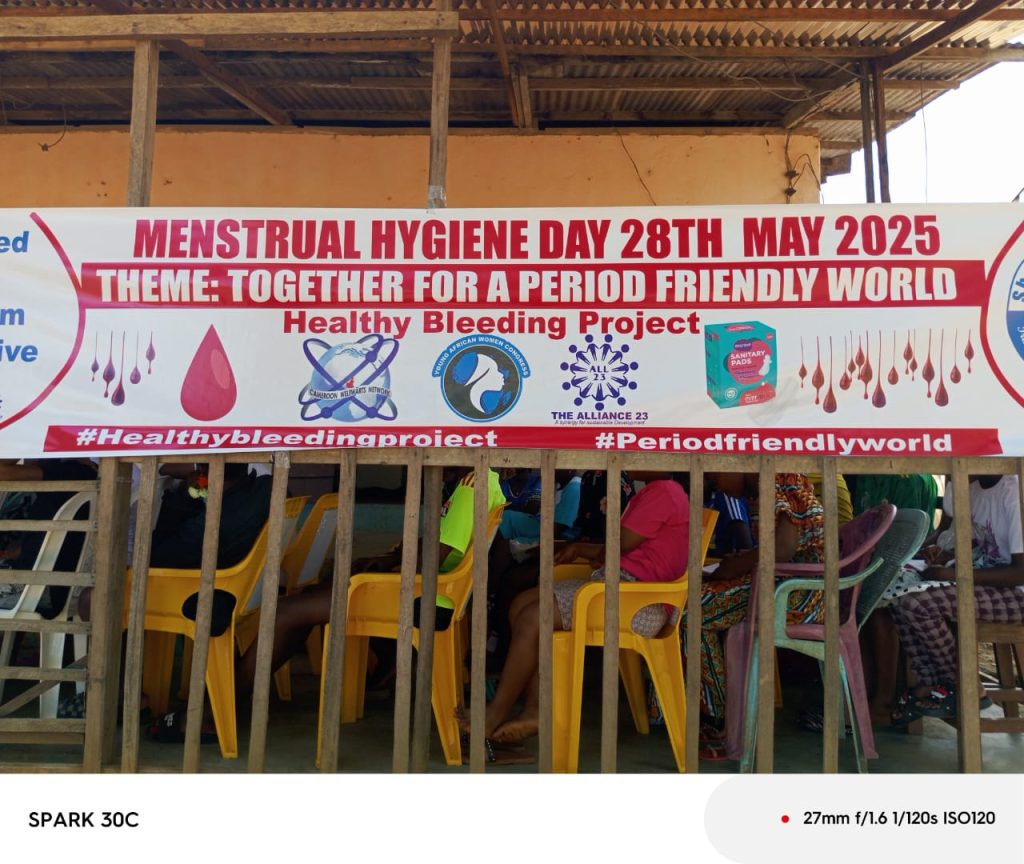
THE ALLIANCE 23 Ongoing projects
The Multi-talent Centre, Foumbot (AnC and Mission21)
The violence in Cameroon’s Anglophone regions is worsening, and the displaced communities have acute needs for protection, food, shelter/NFI, water and sanitation as well as access to health and education. Displaced persons face many challenges when looking for means and ways to develop employable skills and in gaining meaningful employment. The limiting factors are finding a place to be trained and the means to pay for the training.
Young people are suffering from missed opportunities and lack of the chance to rebuild and grow, as some have dropped out of school and apprenticeship opportunities, and have engaged in many unsocial activities – thievery, prostitution, and idling.
The adults and young people are in great hardship, many have abandoned their wives and moved on to other areas, and the women are desperately looking after children. A turnaround is possible through the We Rise Projects.
We Rise Project provides psychological support, economic training for secured livelihood and space for self-actualisation to displaced people in one location. This helps them move from a broken state to independence by developing a mindset of contributing to the good of the host community. Project Activities include counselling and trauma healing for trainees, monthly individual sessions, and special sessions on personal development and coping mechanisms.
The Foumbot centre provides training in small business management, tailoring, embroidery, beads work, barbing, hair dressing, nails and facial make-up.
After successful completion of training, each participant is given start-up support based on their area of interest and economic viability of the chosen business.
The project is implemented by the Mission21 Cameroon Coordination Office in collaboration with Anembom Consulting. The Trauma Healing and Resilience Centre provides counselling and personal development training sessions.
Mission 21 Cameroon started with meeting basic needs, but as people settled down they started having different needs and building different coping strategies. We focused on trauma and stress management, and economic empowerment.
In 2024 we aim to provide a workspace where graduated trainees will work and earn income to support themselves and their dependents. We will be working with each family as a unit of intervention and will help each member meet their potential for employability.
ALChrisWoV
AIChrisWOV supports vulnerable widows, children, people living with HIV, PLWHIV, survivors of gender based violence and survivors of gender based violence in collaboration with Mission 21, Switzerland, the Coordination Office in Cameroon, and other partners provided assistance for the internally displaced persons (IDPs) in the North West Region.
Our target group needs basic livelihood needs, and our sensitization, education, counselling, monitoring, midmonth meetings have brought dignity, smiles and confidence. During this year, we provided health support for medical bills for opportunistic diseases, and homebased care and support to PLWHIV (widows and OVC).
During this year, we created sub groups for beneficiaries in Santa, Bafut, Mbengwi, Wum and Mankon and provided training on income generating activities. This helped in providing personal securities and bringing administration and management nearer to our beneficiaries.
Basic education and vocational training are accessible for all, and improve the quality of life for many people. In the field of education, there has been an increase of children wanting to go to school despite threats of school shutdown, and the rate of GBV increased resulting to many unplanned pregnancies, poor health and school dropout. We observed new risks during the last year, such as shutdowns, kidnaps, gun firing, arm robbers, personal insecurity, high inflation, financial limitation, poor net work.
The project has reduced the rate of sexual and gender-based violence (SGBV) among the target group, improved the health of PLWH, and enabled widows and IDPs to generate their own income and be less dependent on food distribution.
We have provided quality primary health care and prevention measures to all, especially for the most vulnerable and marginalized population, and have provided nutritional support, medical bills for opportunistic diseases, and home based care to 10 OVC, widows, and PLWH.
The project incorporated all who met its conditions for selection and planning, not withstanding their gender, and promoted the Prevention of Sexual Exploitation, Abuse and Harassment (PSEAH) in its organization/project. The diverse needs of women and men were included in the planning, implementation, and monitoring of the project activities.
ChrisWOV always identifies, selects, accompany the beneficiaries at each step and strive to make their businesses more dignified and organised.
Emmanuel Sisterhood
The second phase of the project targeted four major aspects of intervention including health, livelihood, provision of basic needs and education. 64 people were targeted to be provided with health assistance and medication while 60 children were to be assisted in education and 62 more were to be provided with basic needs. 156 were to be provided with epileptic medication and lastly 12 were to be placed in vocational training centers and assisted with starter kits.
The project intervention covers the North West and West Regions, principally in Foumbot (West Region) and Akum, Babanki, Bafut, Ndu and Tatum. The following numbers were assisted in our areas of intervention.
Education: 50 persons were assisted in various educational institutions including 29 in primary schools, 17 in secondary schools and 4 in higher learning institutions.
Basic Needs: 304 internally displaced and persons living with disabilities benefited directly from food assistance including rice and cooking oil.
Health: 416 people were assisted in the area of health with health issues ranging from consultation and medication to major operations and recovery from accidents. Two types of daily epilepsy medication were purchased and distributed at different locations every month.
Vocational Training: 14 children were placed at different training workshops for acquisition of skills in tailoring, shoe making and iron bending (welding).
Establishment of Documents: four children were assisted with the establishment of birth certificates.
Another major deviation in our intervention was the construction of an adapted toilet for one disable case.
The biggest challenges include:
Higher prices for basic commodities, this made us not to reach the number of beneficiaries targeted.
Increasing numbers of MaVus, the demand on us is increasing daily. We had to spread thin to reach more people with very minimal support.
The high level of insecurity, especially in the Tatum area, makes work difficult with reduced access to people in need.
We select participants based on their need and availability of funds. Our programme is open to all who seek help on a non-discriminatory manner – irrespective of religion, tribe, or social orientation.
The biggest challenge is how to meet the increasing needs with limited means. Second there are cases which are beyond our technical competences, which when referred to expertise need huge financial expenditures. Real empowerment is long-term involvement, many who have passed through our centres have set up their own businesses and help others.
There are successful cases where we have assisted groups and there are doing so well with small businesses and are able to help themselves from the proceeds of the business.
How to raise enough funds to meet the demand for help we receive daily. Bringing about small change in the lives of the marginalized and vulnerable and seeing how it impacts on the people’s lives is a challenge as most people in such conditions do not seem to appreciate and respect the terms and conditions that are put in place before giving them assistance. People receive assistance and then used the money for a different purpose. Some do not bring back receipts.
Specially in 2023, the prices of goods went up and we couldn’t reach all we had planned to meet.
We work with the Mission NGO Partner forum, which has developed into a consortium. Collaboration continued with various government concerned ministries – ministries concerned with social affairs, education, and health. As part of the PCC, we work with other departments of the church. We linked up with the various schools where we are supporting and following up pupils and students, health institutions where we refer patients for treatment. Such institutions include all Presbyterian Primary schools in Nkum, the Tatum integrated Health Center, the Banso Baptist Hospital, and the St. Elizabeth General Hospital Shisong.
Project ERRP ; Help out and Mission21 Coordination office
The development context in Cameroon is dynamic given the present security concerns. The country is faced with insecurity in the North, East, and North West and South West (NWSW) Regions. The North is affected by Boko Haram incursion, the East by an influx of refugees from Central Africa Republic and NWSW by an insurgent of separatists. These affect the country in different areas such as the economy, security of persons and property, employment etc. The context is also affected by other external political, economic, and human issues at the global level. Principally among these are lingering effects of COVID-19, ongoing wars – Russia/Ukraine and Israel/Palestine.
The crises continue on all three fronts. The one that most affects our programme work is that in NWSW regions. There are frequent fights between State Security Forces (SSF) and Non-State Armed Groups (NSAGs), as well as between the different NSAGs. The violence continues and the population suffers from increasing use of Improvised Explosive Device (IED), arbitrary arrests, kidnappings for ransom, brutality, sexual abuse, loss of property and loved ones. The economy of the regions is weak, many unemployed, many hospitals not functioning, schools in their hundreds are shutdown, food insecurity is rising, and many children are malnourished. Access to people in need is difficult and, in some cases, dangerous.
Displacement is pendular with people always on the move, some going to their homes (returnees) and are displaced again. Some are displaced for a short period in nearby bushes and return home when there is little calm. In 2023 not less than 32’794 people were displaced because of violence either returning, first or second displacement, and short-term hiding in the bushes. All these movements caused by violence continue to inflict pain on the population and create need. By the end of the year, UNOCHA reported that two million people were in need, but only 1.4 million were targeted for support. Those internally displaced were 628’000 persons, 420’000 had returned and refugees in Nigeria stood at 87’000. With respect funding 43% of the USD 27 million requested was received. (CAMEROON Situation Report Last updated: 30 Dec 2022)
Given the dynamics of the context, we started moving away from relief towards development. In this direction we have embraced four conceptual frames to ensure success and family stability with a clear exit strategy. The first is Trauma Mainstreaming; all those who participate or benefit from Mission 21 sponsored projects will go through a psychological counselling process. Without a balanced and stable mind, there can be no substantial development. The second is the Family Centred Approach which speaks to the fact that helping one individual alone in poverty-stricken family will not make a difference. Any business started for such a person, even with best intentions, skills, and knowledge, will not succeed. Why? The capital will be drained by existential needs – food, health, education, and shelter. Hence to help displaced families move out of poverty in a good and long-lasting way, the family should be helped to the point where family business can take care of family needs without eating into business capital. The third is Knowledge and Skills Development. In this strategic axis, persons in need are train to have employable skills such that they can easily find employment or run their own business. Presently based on potential to start a business or be engaged, the following trades are offered – tailoring/fashion design, beautician, IT and shoe making. The fourth is Sustainable Farms. NGOs work with displaced people and others in need to produce crops and rear animals and birds to provide food to the most vulnerable who would be easily left behind. This concept is undergoing trials and results are showing that there is potential in it.
We have been able in 2023 to bring support of various kinds to 20’188 people in the North West, South West, Littoral and West Regions. This year support came from farms and should increase next year. Already there’s food stuff in barns for distribution and marketing.
Basic Needs (food and non-food items): Though our approach is geared towards training, employability and resilience, many people still support in food and non-food items, given the pendular nature of displacement. Food and non-food items are distributed through different channels. The PCC remains the biggest distributor given her wide network and outreach. The Trauma Healing and Resilience Centres contribute a lot in the provision of food baskets to people who visit the centres. The Coordination Office based on needs and requests also distribute these items. A new contributor to food supply to displaced people is the Sustainable Farms initiative. This year the farm in Souza distributed to people in Souza and Kombe. Corn, beans, and yams are ready for distribution in 2024 from the farms in Foumbot, Souza and Tiko.
Numbers reached with F&NFI:13’308
Education: Access to education is a measure concern, we intervene in different ways: directly supporting a school in a Ediki Kombo, an area where children would not attend school without great external support, provision of books to children at the beginning of the academic year to reduce the financial burden on poor parents, supporting vulnerable and displaced orphans in a school in Ideanua, supporting a school project targeting displaced children in Bafoussam and meeting individual needs as assessed through the Trauma Healing and Resilience Centres and sponsoring displaced children to have higher diplomas in Kumba.
In addition to formal (vocational) education opportunities, displaced youth who cannot got to school are offered various training opportunities. Informal training is offered in agriculture in Limbe. The training is a good mix of theory and practice. Young people are given the opportunity to learn news skills in the domain of information technology. In Bamenda we are supporting young boys and girls to receive training on computer-based designs (infographics) and in Bafoussam young people undergo training in computer and telephone repairs (handling both software and hardware repairs/maintenance). In Bafoussam, Bamenda and Foumbot, training on different crafts is offered to the youth – tailoring, hair dressing/beauty, and shoe making.
Numbers reached through Formal and vocational Education: 2’135 (2’051 & 84)
Protection: Protection activities involved the interventions in Mental Health and Psychological Support Services, basically diagnosis and referrals. Psychological counselling is provided in four centres and include group and individual counselling sessions, games for children, specialised support groups, provision of life skills, vocational training, and legal advice. People, especially women, who have suffered from SGBV through sexual abuse, rape, denial of resources/opportunities come to or centres. They too receive psychological counselling, economic empowerment support, health support and legal provision if they need redress. We also provide prevention measures through sensitisation and education campaigns and awareness raising on the dangers of trauma and early signs. Intensive sensitisation on the ills of SGBV was carried out during the 16 Days of Activism in Foumbot and during the Christmas period in Tabenken in Donga Mantung.
Numbers reached through all Protection Interventions: 4’148
Agriculture and Livelihood: Agriculture is the bedrock of Cameroon’s development, first to feed the population before anything else. MaVus, including those displaced, are farmers. In places of displacement, access to farmland and the means of cultivation is hard to come by. As much as possible displace people, including MaVus in host communities are assisted to farm or rear birds/animals. However, this is not always possible, so other livelihoods opportunities are given to them including setting up small businesses.
Training usually is the starting point to a successful business be it in agriculture, trading, or any other craft. All those are participating in our programme within this sector under some minimal amount of trading. The trainings range from a few days to months depending on what is involved. Short training on bookkeeping may be for a few days before opening a small corner shop or eatery. Some go for months like tailors or agricultural vocational courses.
In the year, we have supported youths, women and men in poultry, pastry, smoking of fish business and access to land. We are supporting four agricultural initiatives fully in fish farming (Bamenda), food crop farming (Foumbot, Souza and Tiko) and one partially in Dibama Buea Municiplaity.
We reached:258 people,
WASH and Health: As in the year before we continue to make access to health possible to the most vulnerable, especially those under five. These services are provided through seven health service providers in the West and Littoral regions and as need be others in the NWSW regions. WASH remains an issue of dignity for women and young girls and a source of life for all people. In Kumba we reached to households with drinking water kits, consisting of water storage containers, drinking cups and water petrifying tablets (aquatab). Young girls and women also received sanitary kits.
We reached (50 households, 171 young girls & women and 181 people accessed health care) 615 people.
Our Areas of Intervention
Honest Reviews
“I have seen firsthand the impact of their work in my community, and I am continually impressed by their dedication to helping those in need.“
“I have received assistance from M21 during a difficult time in my life and I am forever grateful for their support. They provided me with resources and guidance that helped me get back on my feet.“
